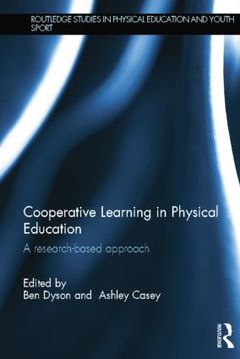Cooperative Learning in Physical Education A research based approach Routledge Studies in Physical Education and Youth Sport Series
Coordonnateurs : Dyson Ben, Casey Ashley

Cooperative Learning is a dynamic instructional model that can teach diverse content to students at different grade levels, with students working together in small, structured, heterogeneous groups to master subject content. It has a strong research tradition, is used frequently as a professional development tool in general education and is now emerging in physical education.
This book defines Cooperative Learning in physical education and examines how to implement Cooperative Learning in a variety of educational settings. It explores Cooperative Learning in physical education from three main perspectives. The first, context of learning, provides descriptions of Cooperative Learning in different levels of education (elementary school, secondary school, and university physical education). The second, Cooperative Learning in the curriculum, offers case studies from teachers and researchers of their experiences of implementing Cooperative Learning within their own national context. The third perspective, key aspects of Cooperative Learning, examines how the different elements of the model have been foregrounded in efforts to enhance learning in physical education.
As the only text to provide international perspectives, from eight different countries, of Cooperative Learning in physical education, this book is important reading for any student, researcher or teacher with an interest in physical education, sport education, sport pedagogy, curriculum development or methods for learning and teaching.
Introduction - Cooperative Learning As A Pedagogical Model In Physical Education Part 1 - Context Of Learning Chapter 1. Implementing The Cooperative Learning Model In Physical Education: The Experience Of New Zealand Teachers Chapter 2. Teacher Action In The Cooperative Learning Model In The Physical Education Classroom Chapter 3. Innovative Practice Through The Use Of Self-Made Materials: The Cooperative Learning Model In Spain Part 2 – Cooperative Learning In The Curriculum Chapter 4. Putting Into Practice Cooperative Learning And Physical Activity With Primary Students Chapter 5. Cooperative Learning Through The Eyes Of A Teacher-Researcher And His Students Chapter 6. Using Cooperative Learning Model In Physical Education Teacher Education: From Theory To Practice Part 3 – Key Aspects Of Cooperative Learning Chapter 7. Borrowing Strategies From Adventure-Based Learning To Enhance Group Processing In Cooperative Learning Chapter 8. The Cooperative Learning Model As An Inclusive Pedagogical Practice In Physical Education Chapter 9. Cooperative Learning And Tutoring In Sports And Physical Activities Chapter 10. Cooperative Learning And Interactions In Inclusive Secondary School Physical Education Classes In Australia Conclusion - Cooperative Learning In Physical Education
Ben Dyson is Associate Professor in the School of Critical Studies in Education at the University of Auckland, New Zealand. He has taught for over 20 years in universities in Canada, the USA and New Zealand. His research focuses on curriculum and instruction, innovative pedagogical practices in schools and physical education policy research.
Ashley Casey is course leader for Sport and Physical Education at the University of Bedfordshire, UK. He has worked as a secondary-school physical education teacher for 15 years during which time he completed his PhD. His research is around sustained curriculum renewal in physical education through models-based practices such as cooperative learning. He has published work on school-based interventions using these approaches.
Date de parution : 03-2014
15.6x23.4 cm
Date de parution : 04-2012
Ouvrage de 200 p.
15.6x23.4 cm
Thèmes de Cooperative Learning in Physical Education :
Mots-clés :
model; positive; interdependence; teacher; structure; small; group; skills; class; mild; Cooperative Learning; Cooperative Learning Model; Inclusive Physical Education Class; Physical Education; Peer Assessment; Pre-service Physical Education Teachers; Physical Education Class; Cooperative Learning Structures; Physical Education Teacher Education; Professional Development; PETE Major; Mild Intellectual Disability; Self-made Materials; Sociocognitive Conflict; Equal Status Interactions; PETE Programme; Inclusive Physical Education; Small Group Skills; Socio-cognitive Conflict; Positive Interdependence; Implementing Cooperative Learning; Cooperative Learning Classrooms; School HPE; PETE Research; Target Student



